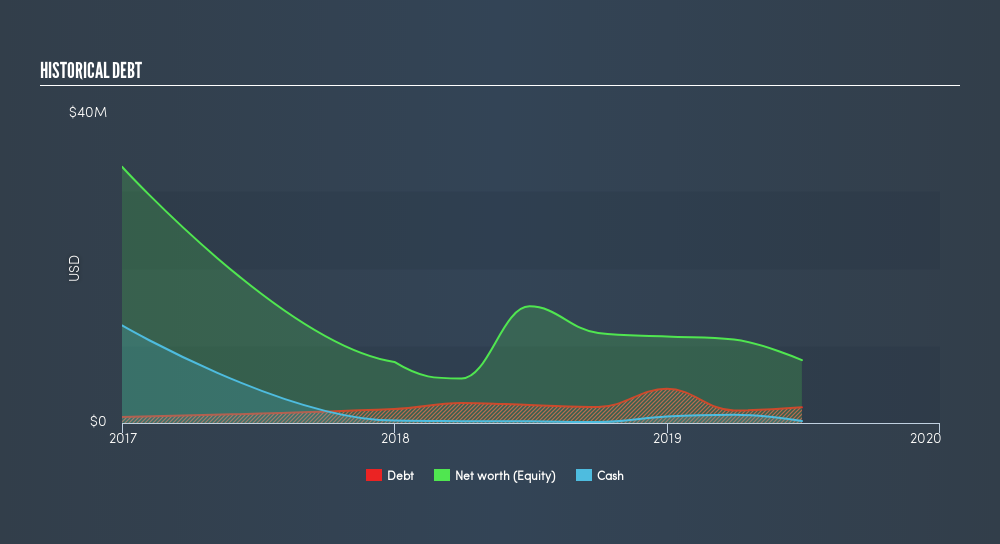
Some say volatility, rather than debt, is the best way to think about risk as an investor, but Warren Buffett famously said that 'Volatility is far from synonymous with risk.' When we think about how risky a company is, we always like to look at its use of debt, since debt overload can lead to ruin. As with many other companies Phunware, Inc. (NASDAQ:PHUN) makes use of debt. But should shareholders be worried about its use of debt?
Why Does Debt Bring Risk?
Generally speaking, debt only becomes a real problem when a company can't easily pay it off, either by raising capital or with its own cash flow. Part and parcel of capitalism is the process of 'creative destruction' where failed businesses are mercilessly liquidated by their bankers. While that is not too common, we often do see indebted companies permanently diluting shareholders because lenders force them to raise capital at a distressed price. Of course, plenty of companies use debt to fund growth, without any negative consequences. When we examine debt levels, we first consider both cash and debt levels, together.
See our latest analysis for Phunware
What Is Phunware's Net Debt?
The image below, which you can click on for greater detail, shows that Phunware had debt of US$2.03m at the end of June 2019, a reduction from US$2.34m over a year. However, it does have US$248.0k in cash offsetting this, leading to net debt of about US$1.78m.

A Look At Phunware's Liabilities
We can see from the most recent balance sheet that Phunware had liabilities of US$17.5m falling due within a year, and liabilities of US$5.38m due beyond that. On the other hand, it had cash of US$248.0k and US$3.55m worth of receivables due within a year. So it has liabilities totalling US$19.1m more than its cash and near-term receivables, combined.
This deficit isn't so bad because Phunware is worth US$58.4m, and thus could probably raise enough capital to shore up its balance sheet, if the need arose. But it's clear that we should definitely closely examine whether it can manage its debt without dilution. The balance sheet is clearly the area to focus on when you are analysing debt. But it is Phunware's earnings that will influence how the balance sheet holds up in the future. So when considering debt, it's definitely worth looking at the earnings trend. Click here for an interactive snapshot.
Over 12 months, Phunware saw its revenue drop to US$23m, which is a fall of 29%. To be frank that doesn't bode well.
Caveat Emptor
While Phunware's falling revenue is about as heartwarming as a wet blanket, arguably its earnings before interest and tax (EBIT) loss is even less appealing. Its EBIT loss was a whopping US$11m. Considering that alongside the liabilities mentioned above does not give us much confidence that company should be using so much debt. So we think its balance sheet is a little strained, though not beyond repair. Another cause for caution is that is bled US$6.4m in negative free cash flow over the last twelve months. So suffice it to say we consider the stock very risky. For riskier companies like Phunware I always like to keep an eye on whether insiders are buying or selling. So click here if you want to find out for yourself.
If, after all that, you're more interested in a fast growing company with a rock-solid balance sheet, then check out our list of net cash growth stocks without delay.
We aim to bring you long-term focused research analysis driven by fundamental data. Note that our analysis may not factor in the latest price-sensitive company announcements or qualitative material.
If you spot an error that warrants correction, please contact the editor at editorial-team@simplywallst.com. This article by Simply Wall St is general in nature. It does not constitute a recommendation to buy or sell any stock, and does not take account of your objectives, or your financial situation. Simply Wall St has no position in the stocks mentioned. Thank you for reading.
About NasdaqCM:PHUN
Phunware
Provides integrated software platform that equips companies with the products, solutions, and services to engage, manage, and monetize their mobile application portfolios in the United States and internationally.
Flawless balance sheet moderate.
Market Insights
Community Narratives





